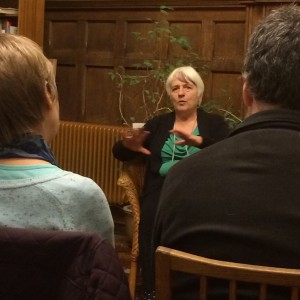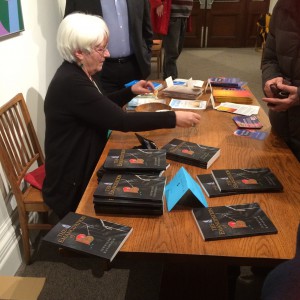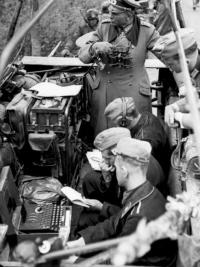
 By Jennifer Kavanagh
By Jennifer Kavanagh
We both knew, Geoffrey and I, that this would be no ordinary launch. I had asked a friend and fellow author to interview me as I thought a) that people would get two for the price of one and b) it would enable me to talk more about process, and give away very little of the content of the book.
The Emancipation of B is a novel that reveals itself slowly - compellingly, people kindly say - but knowing too much at the outset would spoil the momentum of the book. I knew that some people were interested in hearing about moving from nonfiction to fiction and from agenting novels to writing one, and so we had a hook.
I worked in publishing for nearly 30 years, first at Penguin, where my multifarious roles gave me a splendid overview of the publishing process. I ran the proofreading, answered questions from the public, and oversaw the process from manuscript to finished book. Then, when my kids were small, I spent seven years as a freelance - editing, reading for publishers, reviewing, especially for the World Service, and recording bits and pieces for Woman's Hour and so on. My first job back was at a mass market women's magazine, buying fiction and cutting books into serials - a wonderful way to learn about structure, and to be less sniffy about romantic novels. Then I realised that talent spotting was what I loved, and so I became an agent, first for another agency then, for fourteen years, as an independent.
Fiction was my first love. As a child I read a novel a day. I studied literature, and in my publishing life I worked mostly with fiction, especially as an agent, when I had the privilege of launching a number of careers. So it came as a surprise to find myself writing non-fiction, and only now, at my advanced age, turning to fiction.
And in talking about that at the launch I had to be careful. With a couple of experienced novelists in the room, I had to be clear that I was talking not about fiction writing in general, but about my experience in writing this novel. And what a learning curve it has been. Allowing the book to unfold, learning to let go of the wish to control or to know more than is being revealed. Knowing the difference between what has written itself, and what I've tried to impose. When I began, I had only an image (that turned out to be the ending) and knew nothing more. I didn’t even know if the protagonist was a man or a woman. (it turned out to be a man).
So I talked about this process, and the fact that I write neither at set hours nor sequentially, building up from paragraphs scribbled in the park or in the small hours in bed. Sometimes it's just getting stuff down for content; sometimes being arrested by a word or a phrase. Walking along and suddenly realising that, well of course she'd be wearing slippers, or his father was a bully, that's why. Something that I have always known, and now found to be true, is that it is the pondering that matters. The more you ponder, the fewer false starts there will be. As Joyce Carol Oates said, " "Novels begin, not on the page, but in meditation and daydreaming. In thinking, not writing."
I was asked about themes and, answering with care, I could confirm that they include freedom, and the difference between loneliness and solitude. I was asked how autobiographical it was, and could only say that, as in dreams, it is all me, but isn't obviously so. The novel was born at a particular time, when I was stuck at home, recovering from a hip operation. It came from that experience, but that's certainly not the subject.
And, although in my non-fiction I write from experience, both others' and my own, and the novel isn't overtly about me, it actually feels more personal, more exposed, because it comes from a more vulnerable place. Although the launch took place in a Quaker meeting house, it is not a Quaker book, nor an overtly religious one although, as it comes from me, and my spiritual life is central to who I am, in a fundamental sense it is.
Although I've only been writing for twelve years, I now feel impoverished when I am not in the middle of a book. All the more so with fiction (and yes, another is brewing), which feels like an accompaniment to my life, or as a novelist friend said, a parallel life.
How subtle the spirit, the creative impulse, is. As in life, we just have to surrender and learn to trust that we will be shown the way.
You can find the Emancipation of B here -
eBook AMAZON US | AMAZON UKPaperback AMAZON US | AMAZON UK
Photos in this blog, c.Heather Martin
Categories:
0 comments on this article








